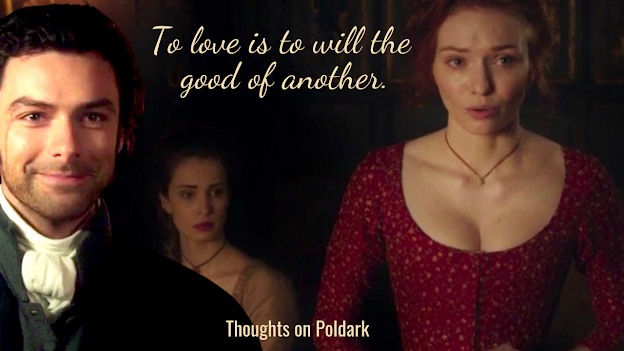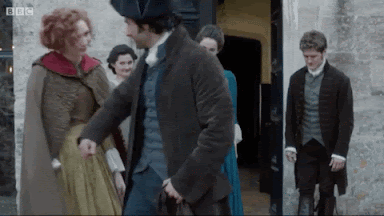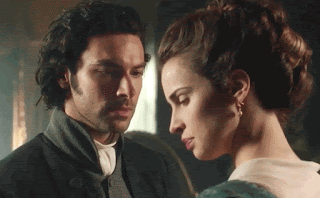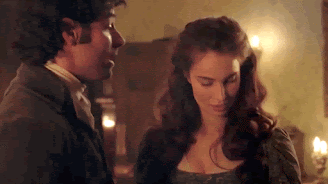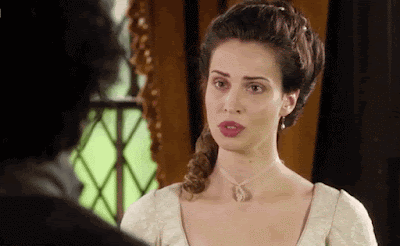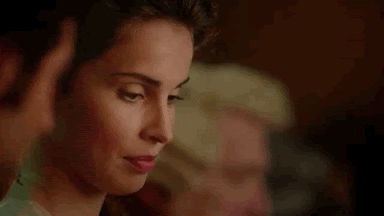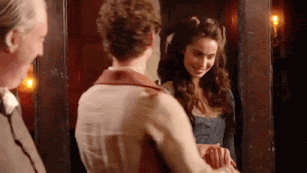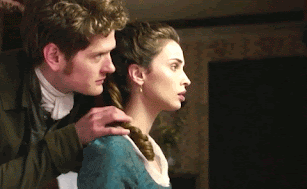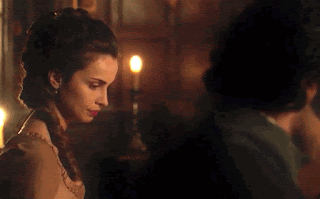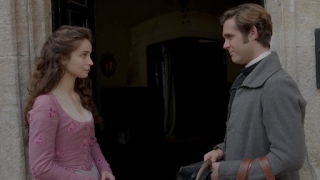Following Elizabeth's troubles over her marriage and her attempt to reach out to Ross after four years during her random and unexpected visit to Nampara, we see that she hit what appeared to be a dead end with him there. This is explored on the last blog Reaching out For Ross. There realising that there was something between Ross and Demelza Elizabeth thinks 'I cant come here again..After all this time, and now it's too late.' In this eighth blog of the series looking at Elizabeth's love or lack of love for Ross Poldark, her reaction to his marriage is the focus. This is alongside some of her past behaviour and this with her self love is considered more specifically against a definition of what true love is, in order to see if Elizabeth comes close to this regarding her feelings for Ross.
Silence From Elizabeth for Ross's Good news
In the last blog (The Real Love Triangle, The Powerful Rival) Graham had advised the reader that Francis was wrong to be jealous of Ross. This was since unknown to him Geoffrey Charles was his real rival for Elizabeth's love. Not Ross. Despite this and since Francis had not yet come to this realisation for himself, we are told that upon hearing the news of Ross's marriage 'Francis seemed relieved rather than shocked:..' Although in the latest television adaption he was written as being shocked and even concerned about the affect of such a marriage on Ross's reputation. That was not the case in the original book story where he was quite supportive of the marriage. Verity wrote Ross a letter to convey her congratulations and well wishes. There was no reported response of Elizabeth. Yet if the premise of Graham's story included Elizabeth making a mistake, being and remaining in love with Ross all along, it is strange that her immediate reaction to his marriage to another woman was not considered a key thing to document and then used to emphasis that she was indeed in love with him. The absence of this suggests that a love of Ross by Elizabeth was in fact not a key or definite premise to this story even though some readers may feel quite strongly that it is and that she always did love him very much.
The Instinct of Love
It was not until Ross and Demelza were invited to Trenwith for Christmas six months after their marriage announcement that the reader got to see Elizabeth's acknowledgement of it. However even if Elizabeth was not happy for herself about Ross's news, after four years of bachelorhood her own feelings should not have been her focus. His happiness should have been and her lack of response is already an interesting lack of action on her part to his big news. This is especially when thinking back to Ross's distress at Elizabeth's betrayal of her promise to marry him and her lack of empathy and sensitivity in dealing with his pain then. This is as set out in the Just a Boy and Girl Attachment blog. Elizabeth had clearly left Ross heartbroken in her rejection and as she admitted herself this was by letting him down in failing to 'keep the faith' with him.
As a consequence and having lived those last four years single and without love, at a minimum, the gracious thing to have done would be some sort of earlier acknowledgment of his marriage together with an expression of well wishes for him just as Verity did. This should actually have been an instinctive act if she genuinely did feel happiness and good will for him. Or otherwise at least to have felt happy to be relieved of some guilt the longer he remained alone and lonely following her betrayal. Of course marriage is a life changing event and so in contrast to Verity's quick and positive response Elizabeth's muted reaction could actually be viewed as quite rude or cold and really does give an impression that she did operate on a premise of self absorption. Or otherwise it was thoughtlessness, which is often born from some degree of self absorption in any case. Naturally this should not have been the case. Even if this development in Ross's life was painful to Elizabeth a loving attitude of self sacrificing and putting her own sadness (wherever that truly stemmed from) and regret to the side is expected in order to support and cheer the happiness of a loved one. It becomes apparent as time went on that Elizabeth could not do this.
Even if it is wrong to presume there was a lack of response from Elizabeth in the entire six months between Ross's marriage and the Trenwith visit, and one is to instead assume Graham just chose not to write about it, there are still themes of Elizabeth's self absorption and thoughtlessness following Ross's marriage. They go beyond a reasonable tinge of jealousy and lean towards seeking to actually unsettle Ross's happiness. This is explored in the blog exploring her flirtatious behaviour with Ross (A Touch of Red Dress Seduction) and her goading for his interest in her despite his happy marriage to Demelza. It therefore more than calls in to question Elizabeth's good will and happiness for and towards Ross. All these are important factors to consider in order to understand whether Elizabeth truly did love Ross. Of course being drawn to, attracted to, tempted by, or otherwise having 'feelings' for someone does not necessarily mean that that feeling is a feeling of true love. It could be a fancy, lust, infatuation or and interest based not on love but an appeal based on practical considerations such as what that person can provide to them. At this point a definition for love will provide crucial and further guidance.
Not Happy You Are Happy
"To love is to will the good of another."
Saint Thomas Aquinas
This quote are the words of the thirteenth century Italian philosopher Saint Thomas Aquinas. He was a catholic priest and Doctor of the church who passed way in 1274. It is self explanatory as his definition of what love is and so Aquinas preached that we love those that we truly wish the best for. That is one of the best descriptions of the essence of real love and many inspirational speakers have embraced and expanded on this definition highlighting further that love is not just a reaction of desiring, liking and having an affection for someone but on a much higher level. So much so that true love is actually a spiritual commitment to uphold and wish for the best interests of that other person. Also for this to be possible an element of selflessness is required where one's own ego is sacrificed if necessary to uphold the other person's best interests. And so there's a growing acknowledgement that in addition to Aquinas's definition or rather to compliment it, 'The opposite of love is not hate but selfishness.' Whilst hate is an extreme emotion which is automatically devoid of love, unloving acts are not only done by hateful people. People that are not particularly hateful can also do unloving acts too. So hate cannot be the core requirement of unloving behaviour. Instead the core requirement is when a person simply and sometimes instinctively puts themselves first above the person they claim to love and also to that other person's detriment. This is where in being selfish, self love prevails over love for the other person. This idea was promoted by the late American evangelists Billy Graham but more so Tim LaHaye who was inspired by bible ideology such as the famous passage that 'There is no greater love than to lay down one's life for one's friends.'' (as in John 15: 13) or that 'Love is not ill-mannered or selfish..' (as in 1 Cor 13:5).
Even without religious doctrine the idea that selfishness contradicts a real and true love is a fairly acceptable one for anyone to also adopt and though people are often flawed and may fall into selfishness from time to time, a consistent instinct of self love over and over again and above the best interest of a supposed loved one or on big issues must call into question whether the feelings of that person is genuinely a true love.
Elizabeth: A Track Record of Self Love
Before looking at Elizabeth's reaction to Ross's marriage, the ideology and definition of love from Aquinas, Graham and LaHaye does seem to endorse the conclusions of the previous blogs looking at whether Elizabeth really loved Ross. This is because many of the previous blogs identified that Elizabeth's focus was ultimately on her own needs above Ross's. Sometimes this made her completely blind to Ross's needs and feelings and her self focus therefore manifested itself into behaviour which was essentially unloving. In the last blog Reaching out for Ross we learn that four years after her rejection of Ross his resentment over Elizabeth's marriage to Francis had gone. However her apparent pursuit of a romantic reconciliation when visiting him at Nampara, if successful would have meant that Ross would be emotionally re-invested in her. That would only serve her needs for comfort and jeopardised his own good progress in trying to move on with his life. This is especially as Ross would have the least to gain since as a married woman Elizabeth was essentially and formally unavailable to him. Such an adventure did not put his best interests at the forefront of consideration. It put hers! That was therefore her self focus in action and so in this situation it is hard to think of this as a proposal motivated by true love for him rather than her self love to meet her own desires.
Unloving Concerns
Tables turned- Return happiness to sender
Of course with Ross's happy marriage news the tables turned and the spotlight here is on whether Elizabeth could do the very thing that she had asked and expected of Ross, which was to be happy for her when she married another man, his cousin. Now could Elizabeth be happy for him? In looking at Elizabeth's reaction to Ross's marriage the concepts of love from Aquinas and LaHaye are very relevant. Just as it was Morwenna's wish for Drake to be happy without her and his wish for her to be happy when made to marry another man, Ross's marriage was a true test for Elizabeth to show a selflessness and a true and real love for Ross in wanting him to be happy finally. This would have been in her ability to be self sacrificing and selfless in respect of any of her own wishes, feelings and needs, to set them aside and instead to be happy for Ross and to genuinely wish him well in securing his own happiness in his new life. Certainly unlike Verity or Francis, Graham did not stress that Elizabeth was happy for Ross. He quite clearly implied the reverse and this is telling about her ability to truly love.
"Can't make him happy, be happy someone else can."
Elizabeth never ever said or thought that if she could not be with Ross and make him happy that she would be happy someone else could. However that should have been her thinking and would be akin with the concept of loving someone and therefore letting them go. As with those scholarly definitions of love, this ultimately would have been the loving thing for Elizabeth to do and feel. Especially as by virtue of her own marriage she herself was officially off the market to Ross anyway. The thought of 'if I cant have you, I don't want anyone else to' is not a loving but selfish one. Of course she would have considered his marriage as something that was good for him and which would bring him happiness. As referenced in the blog The Real Love Triangle, the Powerful Rival in the early happy days of Elizabeth's own marriage and where at that point in her life with Francis she was sighing happily thinking that 'life is good', she also thought of Ross's loneliness and at that point was sorry for him. His life as a bachelor was perceived by her to be a lonely one and therefore not a 'good life'. Therefore, and obviously if Elizabeth desired good things for Ross she would consider that him finally finding someone to share his life with, ensure that he was not lonely and to make him happy, was indeed good for him. Indeed that good thing was Demelza. Married herself Elizabeth could not give Ross this happiness herself and so this news should have been a bitter but also a sweet comfort to her in light of the pain and years of his loneliness at her hands.
Happier having him hanging on a string
As the story progresses, after months of making no contact with Ross, his show of happiness would trigger a response in Elizabeth which would firstly reveal she was not truly happy for him and supportive that his marital happiness should be maintained. That would be her decision to try and rebuild her ascendancy over Ross in competition with his wife. Secondly, it would a little later in the story prompt her to take action which did not show a willingness to be self sacrificing and to ultimately desire good for him above her own desires. That would be in her flirting and slight goading for his love and attention. This is explored in detail in the next blogs Elizabeth Poldark: A Touch of Red Dress Seduction and upcoming blog 'A Vague Confession of Love'.
An Author's Joke of Elizabeth's Unhappiness for Ross
If I'm Not Happy, You Cant Be Either
Whether Elizabeth was not really happy for Ross for a selfish or non genuine reason is important to be clear on. Three years before, on Geoffrey Charles's Christening, Elizabeth feeling sorry for Ross was based on him being lonely. So the question of what could have changed her outlook for Graham to jokingly reveal she was not happy now, is of interest if it relates to herself and hence rooted in selfishness? We know that she had developments in her life in those years. By that Christmas period, following her visit to Nampara six months before, and with Verity's report that Francis and Elizabeth had not got on well since Geoffrey Charles was born, the main development for Elizabeth was an end to the happy and good days of her own marriage to Francis. Her marriage was now suffering. They were also not as financially well off as before. Elizabeth's marriage was in freefall with little hope of a romantic recovery. Any doubt about this was confirmed by Elizabeth at the Christmas gathering where she complained to Ross that not only was Francis still gambling but that by then she knew he was seeing another woman. Elizabeth also had another man who she was preoccupied with and instead directed her love too. Geoffrey Charles.
A Selfish Unhappiness
Of course it is only human to sometimes feel some jealousy or resentment but when directed at a loved one, as a bottom line this should not override happiness that they have finally after four years secured something special for themselves. In Ross's case this was a life companion and as previously stated something Elizabeth could not herself give him anyway. Elizabeth being unhappy for Ross because she was no longer happy in her marriage and because him having a wife made it difficult for her to get emotional and romantic comfort from him, is undoubtedly self focused. It does mean that her lack of happiness was based on selfishness. This we know is the opposite of love. Contrary to Aquinas's requirement of love to 'will the good of another' and LaHay's to be selfless and therefore self sacrificing in order to show love to another person, once again Elizabeth's behaviour and feelings therefore do not prove that her love for Ross was true and real.Despite Elizabeth's noticeable and initial lack of response to Ross's good news of marriage, after she came face to face with the happy newly weds she then later expressed curiosity as to whether Ross was happy with Demelza. At Trenwith for that first Christmas gathering, when the issue of story telling arose she said to him "Your own must now be happy with so charming a wife." Though framed as a statement it was clearly an inquisitive ploy to elicit from Ross if he was happy with Demelza.
In book three (Jeremy Poldark) Elizabeth made similar enquiries to Dwight asking about Ross and Demelza "Would you think that they were happy together?" Of course the enquiries are not the issue of concern but rather the intent behind it. As mentioned, as the story continues Elizabeth's unhappiness in Ross's happiness is manifested further in her attempts to tease his interest back to her. This Elizabeth did in a number of ways by trying to get Ross to put her to the forefront of his mind in place of his wife and later leading him to believe that she was in love with him. These acts will be explored in separate blogs but there can be no doubt that if successful this would have disturbed Ross and Demelza's happiness together. This would unquestionably be a selfish act which by virtue of that, was not loving towards Ross. Again it put her own needs above Ross's and did not have Ross's best interests at heart.
Having established here that Elizabeth was not really happy for Ross in his marriage happiness, the next blog Elizabeth Poldark: A Touch of Red Dress Seduction will look at one element of Elizabeth's first attempts to 'rebuild her ascendancy over Ross', revive his interest in her and whether there is any love to be found in this mission of hers.
(*) First edition print
